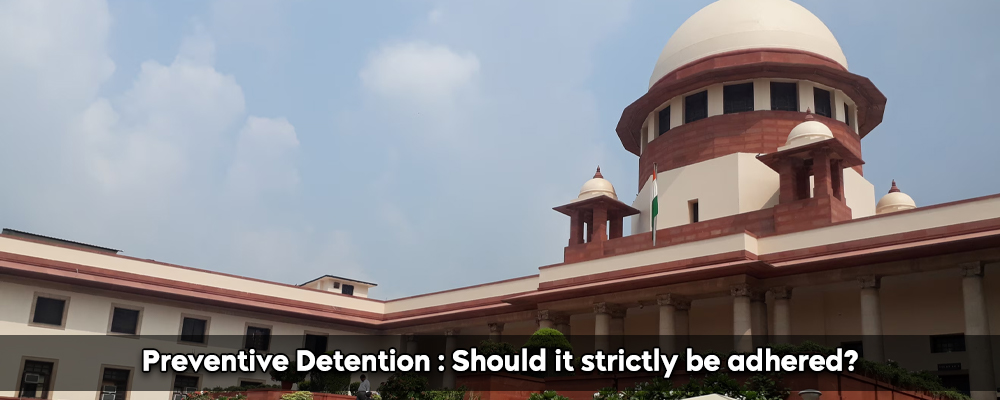According to Section 151 of the Criminal Procedure Code, a police officer may make an arrest without the magistrate’s consent or a warrant if it is in the officer’s opinion necessary to stop the commission of the crime. The constitutional protections pertaining to such detentions are outlined in Art. 22. State security, public order, foreign affairs, and community services are the justifications for preventive detention.
Need A Legal Advice
The internet is not a lawyer and neither are you. Talk to a real lawyer about your legal issue

What protections are offered to the detained person?
- A person may only be placed in preventive detention for three months in the first instance.
- Beyond 3 months, the detention duration may only be prolonged with the Advisory Board’s consent.
- The right of the detainee to be aware of the reasons behind his or her custody.
- However, if it is in the public interest, the state may decline to disclose the reasons.
- The inmate is given the chance to contest their custody.
What justifications exist for preventive detention?
Protection of National Security
By enabling authorities to imprison people who may be a threat to public safety, national security, or the peace and order of the society, preventive detention laws are vital to protect national security.
Preventive detention can be used as a proactive crime prevention strategy to stop crimes before they start. People who are likely to commit crimes or who have committed crimes in the past are frequently detained using this method.
Supported by Judiciary
Because these laws have been so effective in preserving public order, the judiciary has affirmed their legality. In order to avoid arbitrary imprisonment of people and to guarantee that preventive detention is used wisely, the Supreme Court has also established rules.
- The Supreme Court maintained Section 151 of the CrPC’s constitutional validity in Ahmed Noor Mohamad Bhatti v. State of Gujarat, concluding that the abuse of this power by the police officer could not render this provision arbitrary and irrational.
- It was determined in the case of Mariappan v. The District Collector and Others that the purpose of imprisonment and the laws governing it is not to punish anybody but rather to prevent the commission of specific offenses.
- In the case of Prakash Chandra Yadav v. State of Jharkhand, Civil Appeal No. 4324 of 2023, Person who was imprisoned under the Jharkhand Control of Crimes Act 2002 filed the appeal. This law gives the state government the authority to detain a “anti-social element” in order to stop them from engaging in criminal activity. In accordance with Section 19 of the Act, the government is required to provide the Advisory Board with the justification for the detention order and the representation of the affected individual within three weeks after the detention.In this instance, the detention order revealed the reasons the appellant was being held, including information on 18 charges that were still pending against them. A protest against this order was made by the appellant and presented to the prison staff. The government requested the Advisory Board’s decision on whether to keep the detainee in custody, stating the reasons why, but omitting to submit the appellant’s arguments to the Board. In the end, the Advisory Board determined that there was sufficient proof to keep the detainee longer than three months. The State Government issued an order confirming the initial imprisonment based on the Board’s report.Justice Aniruddha Bose and Justice Sudhanshu Dhulia of the Supreme judicial’s bench noted that preventative detention rules are inherently strict since they restrict individual freedom without a judicial hearing. The procedure becomes essential for the detainee’s rights as a result. The court ruled that preventative detention statutes must be adhered to scrupulously.
Although rules governing preventative detention can be important in upholding peace and order, its implementation must be done carefully to prevent any breaches of human rights. In order to protect people from unjustified damage, the government must make sure that these laws are not abused and are only applied when absolutely required. Individual rights are fundamentally protected by Article 22 of the Indian Constitution, which also forbids arbitrary arrest and imprisonment. The right to legal representation and the requirement to appear before a magistrate within a reasonable amount of time guarantee that the individual who is being held in custody is kept informed and has access to counsel. A person is not kept in custody forever, and preventive detention is not abused by the government, thanks to the restriction on its use clause.
Lead India provides data, legal services, and free legal advice online. The best advice in this scenario is to talk to a lawyer and ask a legal question.





 Talk to a Lawyer
Talk to a Lawyer